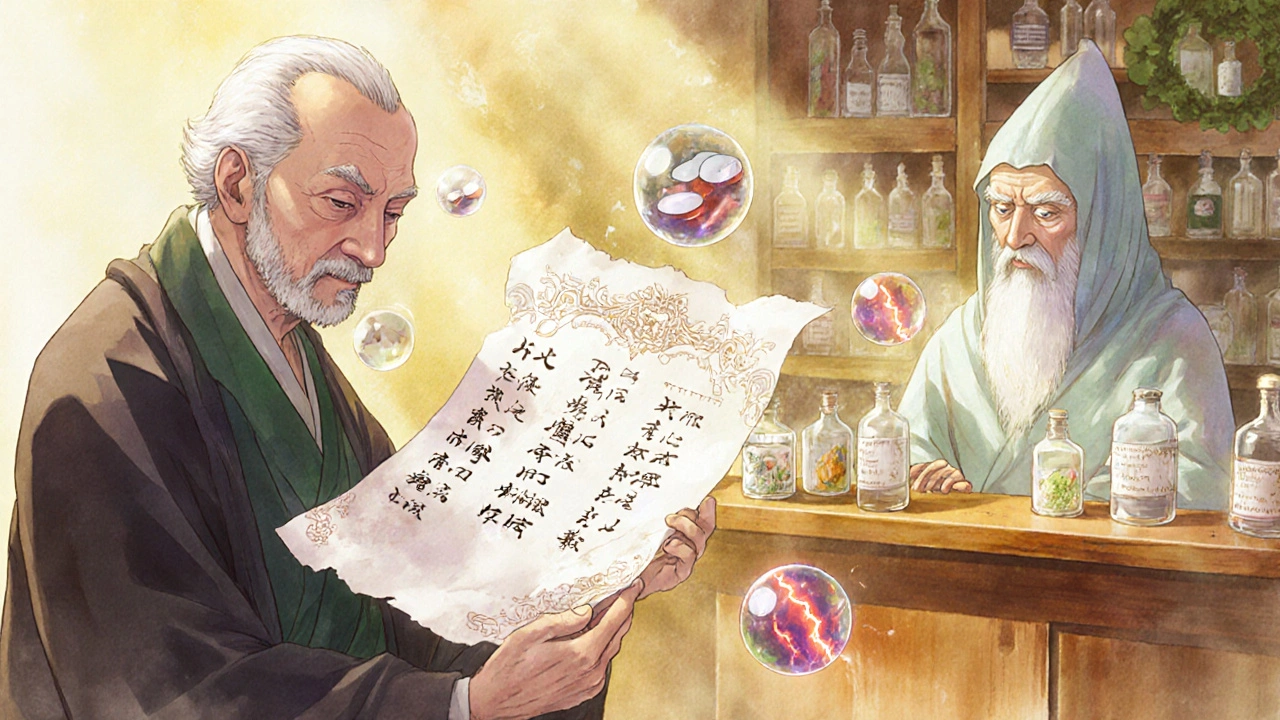
Why Coordinating Multiple Prescriptions Matters
More than 4 in 10 adults over 75 take ten or more prescription drugs every day. That’s not just common-it’s dangerous. When you’re juggling medications for high blood pressure, diabetes, arthritis, and heart disease, the risk of harmful interactions spikes. One wrong combo can cause dizziness so bad you fall, kidney damage from overused painkillers, or even a stroke from a hidden drug interaction. The CDC says medication errors send over 1.3 million people to the ER each year. Most of these aren’t mistakes by doctors or pharmacists-they’re caused by fragmented care. You get a new prescription from one doctor, pick it up at a different pharmacy, forget to tell your pharmacist about the turmeric supplement you take for joint pain, and suddenly, your body is reacting to a mix no one saw coming.
Start with a Complete Medication List
You can’t fix what you don’t see. The first step is writing down every single thing you take-not just prescriptions. That includes over-the-counter pain relievers like ibuprofen, vitamins, herbal teas, and supplements like fish oil or melatonin. Many people leave these out because they think they’re "not real medicine." But 82% of dangerous interactions involve something you bought without a prescription.
Your list needs four key details for each item:
- Drug name (both brand and generic-e.g., "Lisinopril (Zestril)")
- Dosage (e.g., "10 mg once daily")
- Timing (e.g., "Take with breakfast," "Take at bedtime")
- Purpose (e.g., "for high blood pressure," "for sleep")
Keep this list updated. Every time your doctor adds, removes, or changes a medication, rewrite it. Carry a printed copy in your wallet. Show it to every pharmacist, nurse, and doctor-even if they say they can see your records. Electronic systems often miss something, especially if you’ve switched providers.
Use One Pharmacy for Everything
Going to different pharmacies for different prescriptions is like giving each pharmacist half the puzzle. One pharmacy might see your blood pressure medicine. Another sees your antidepressant. Neither sees both-and neither can spot the dangerous combo.
Research shows pharmacies that have your full history catch 94% of potential drug interactions. When you split prescriptions across multiple pharmacies, that drops to just 47%. That’s more than double the risk.
Find a local pharmacy that offers medication synchronization (med sync). This service lines up all your refill dates so you pick up everything on the same day each month. It’s not just convenient-it’s a safety net. Pharmacists review your entire regimen during each sync visit. They check for new interactions, outdated meds, and unnecessary duplicates. A 2023 University of Florida study found med sync users had 22% fewer ER visits and 18% fewer hospital stays.
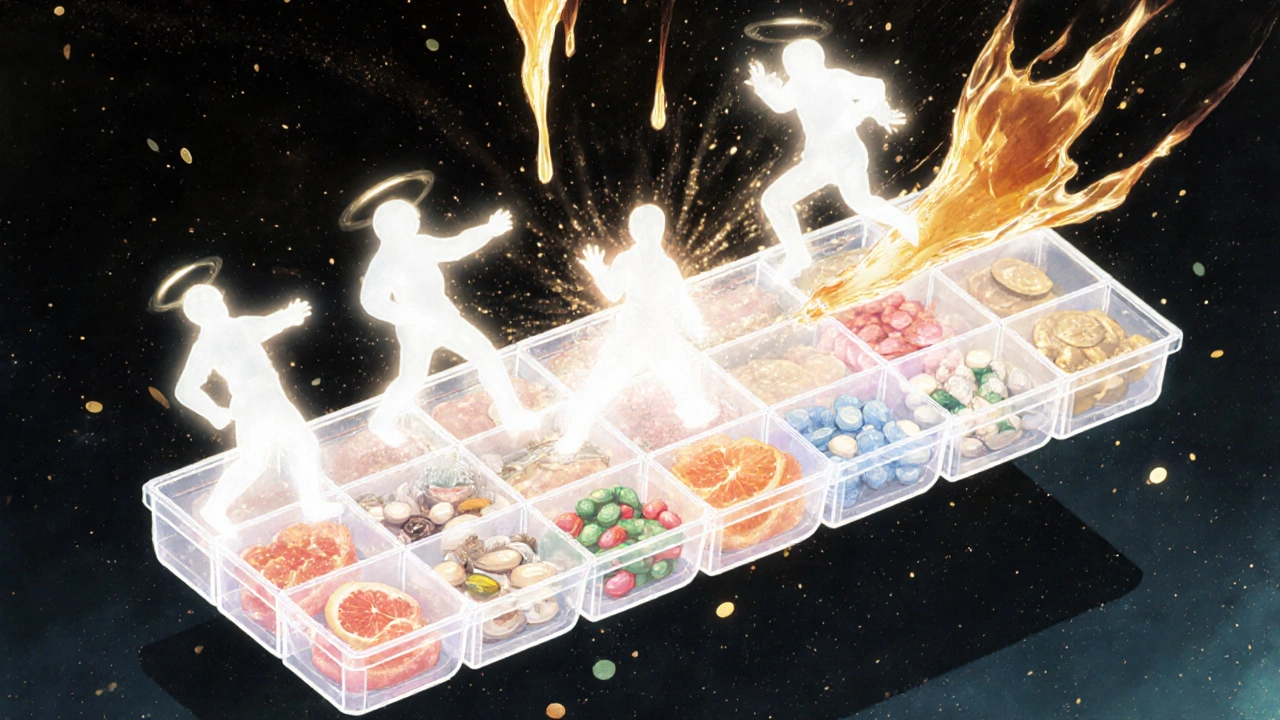
Use a Pill Organizer-The Right Way
Pill organizers aren’t just for seniors. Anyone taking four or more daily medications benefits. A 2023 study in the Journal of General Internal Medicine tracked 1,245 people using 7-day AM/PM pill boxes. After six months, their adherence jumped from 62% to 87%. That’s not luck-it’s structure.
But not all organizers work the same. Basic plastic trays? Fine. Ones with alarms? Better. Devices like Hero Health’s smart dispenser cost nearly $900 and can text you when you miss a dose, lock pills to prevent overuse, and even alert your family. But you don’t need the fancy version. A simple weekly organizer, filled on Sunday evenings while watching your favorite show, works just as well. Consistency matters more than tech.
Fill it yourself. Don’t let someone else do it unless you’re watching. A nurse or caregiver might mix up the pills. If you’re unsure about how to split your meds, ask your pharmacist to show you. Many pharmacies offer free pill packing services for complex regimens.
Know the High-Risk Combinations
Some drug combos are ticking time bombs. The American Geriatrics Society’s 2023 Beers Criteria lists 30 dangerous pairings that should be avoided in older adults. Here are three you need to watch for:
- NSAIDs (like ibuprofen) + blood pressure meds: Ibuprofen can cancel out the effect of your blood pressure pill and damage your kidneys. This combo causes 22% of preventable hospitalizations in seniors.
- Calcium supplements + thyroid medication: Calcium blocks absorption of levothyroxine. Take them at least two hours apart.
- Statin cholesterol drugs + grapefruit juice: Grapefruit makes statins build up in your blood, raising the risk of muscle damage and kidney failure.
Also watch for side effects that seem "normal" but aren’t. Dry mouth, drowsiness, confusion, nausea, or unexplained bruising could be signs of an interaction-not just aging. If you notice a new symptom after starting a new drug, call your pharmacist before your next appointment.
Ask About Deprescribing
Just because a drug was prescribed once doesn’t mean you need it forever. Many older adults keep taking medications long after they’ve outlived their benefit. A 2023 study found that nearly 1 in 4 seniors were still on a drug that was no longer helping-and sometimes, actively hurting.
Ask your doctor: "Is this still necessary?" and "What happens if I stop it?"
Deprescribing isn’t about cutting pills randomly. It’s a planned process. Your doctor may reduce the dose slowly, monitor your symptoms, and replace a risky drug with a safer alternative. For example, switching from a long-acting benzodiazepine for sleep to a non-drug therapy like cognitive behavioral therapy for insomnia. The American Psychiatric Association, American Geriatrics Society, and ASHP all agree: regularly reviewing your meds is part of good care-not a sign you’re failing.
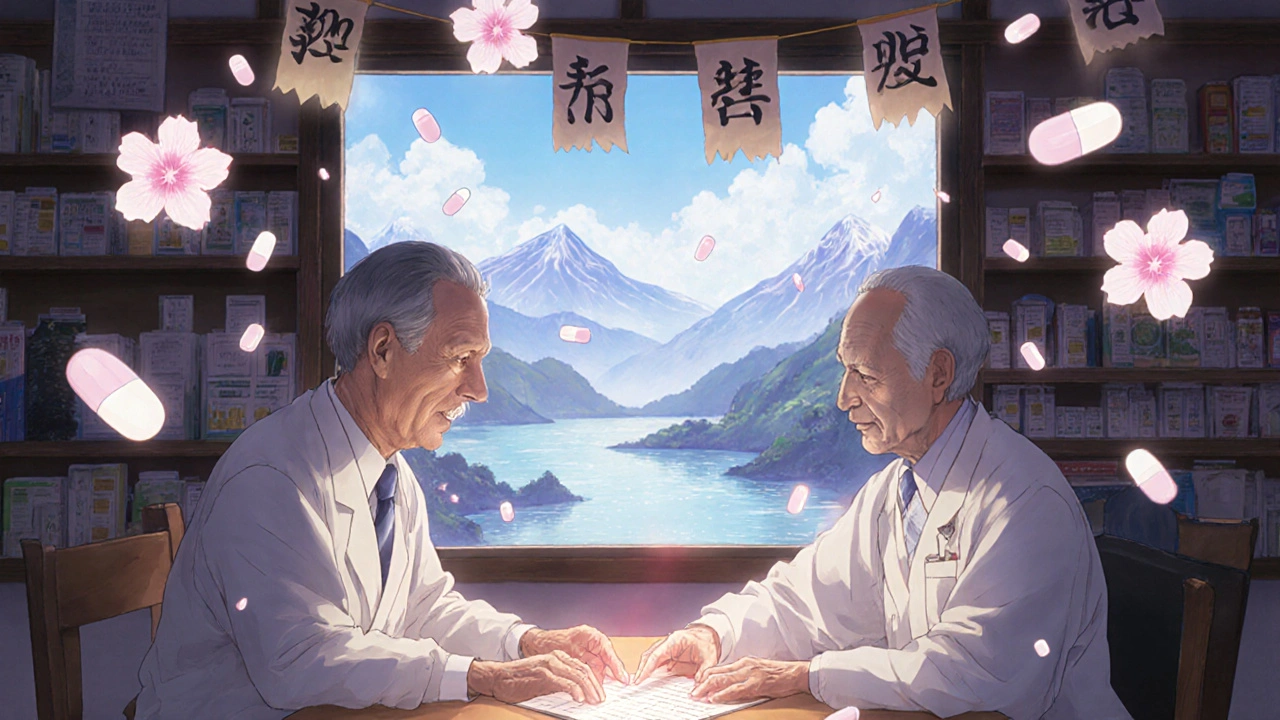
Use Digital Tools-If They Fit Your Life
Apps like Medisafe and MyMeds send reminders, track refills, and alert you to interactions. A 2022 JAMA study found users had 28% better adherence than those using paper logs. But here’s the catch: 62% of adults over 75 don’t use smartphones regularly. If you’re not comfortable with apps, don’t force it.
Instead, use free tools built into your pharmacy’s website. CVS, Walgreens, and Rite Aid all offer text or email refill reminders. CVS’s system alerts you 72 hours before you run out. In a trial of 3,115 patients, this reduced missed doses by 28%.
For those who can use tech, set up automatic refill alerts and sync them with your calendar. But remember: apps don’t replace human review. Your pharmacist still needs your full list.
What to Do If You’re Overwhelmed
If you’re taking eight or more medications, you’re eligible for Medication Therapy Management (MTM)-a free service offered under Medicare Part D. Pharmacists spend 20-30 minutes with you, reviewing every pill, checking for duplicates, and suggesting simplifications. Patients in MTM programs have 37% fewer medication-related problems.
Call your pharmacy and ask: "Do you offer MTM?" If they say no, ask them to connect you with one that does. You don’t need a referral. You just need to be on Medicare Part D and taking multiple meds for chronic conditions.
And if you’re caring for someone else, step in. Help them organize their list, accompany them to pharmacy visits, and speak up if something seems off. Many seniors don’t realize how dangerous their meds have become.
Final Checklist: Your Action Plan
- Write down every medication, supplement, and OTC drug you take-include dosage, timing, and why.
- Pick one pharmacy and fill all prescriptions there.
- Ask about medication synchronization-get all refills on one day.
- Use a pill organizer, even a basic one, and fill it weekly.
- Ask your doctor: "Can any of these be stopped?"
- Know the top three dangerous combos (NSAIDs + BP meds, calcium + thyroid, statins + grapefruit).
- Call your pharmacist if you notice new side effects-don’t wait.
- Sign up for MTM if you’re on Medicare and take 8+ meds.
Coordinating your meds isn’t about being perfect. It’s about being aware. One small step-like using one pharmacy or writing down your list-can prevent a hospital stay. Your health isn’t a puzzle you solve alone. It’s a team effort. Start by giving your pharmacist the full picture.
What should I do if I forget to take a pill?
Don’t double up unless your doctor or pharmacist says it’s safe. For most medications, if you miss a dose by a few hours, take it as soon as you remember. If it’s almost time for the next dose, skip the missed one. For blood thinners, insulin, or seizure meds, always call your provider-those require specific instructions. Keep a log of missed doses to share at your next review.
Can I use a pill organizer for all my medications?
Not always. Some pills shouldn’t be removed from their original packaging-like those that are sensitive to light, moisture, or heat. Nitroglycerin, for example, loses potency if taken out of its bottle. Always ask your pharmacist before transferring pills into an organizer. Also, avoid using organizers for medications you take on an as-needed basis, like pain relievers or anxiety meds, since timing varies.
How often should I review my medications?
At least once every six months, or anytime you see a new doctor, start a new drug, or notice side effects. Even if you feel fine, your body’s needs change. Kidney and liver function slow with age, which affects how your body processes drugs. A yearly medication review with your pharmacist is one of the most effective ways to stay safe.
Are herbal supplements really risky with prescription drugs?
Yes. St. John’s Wort can make birth control, antidepressants, and blood thinners stop working. Garlic and ginkgo can increase bleeding risk when taken with aspirin or warfarin. Even common ones like vitamin E and fish oil can interfere with blood clotting. Always list supplements on your medication sheet-don’t assume they’re harmless.
Why does my pharmacist ask so many questions when I pick up a new prescription?
They’re not being nosy-they’re protecting you. Pharmacists are trained to spot interactions your doctor might miss, especially if you’re seeing multiple specialists. They check your full list, your allergies, your other conditions, and even what you eat. A simple question like "Do you take anything for heartburn?" could prevent a dangerous interaction with your cholesterol drug. Answer honestly-they’re on your side.

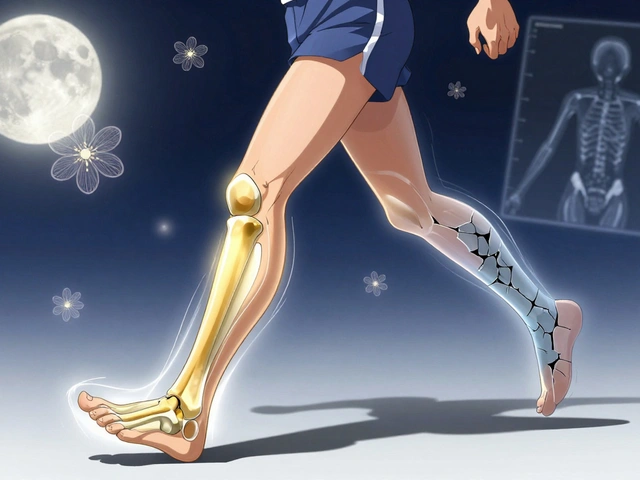
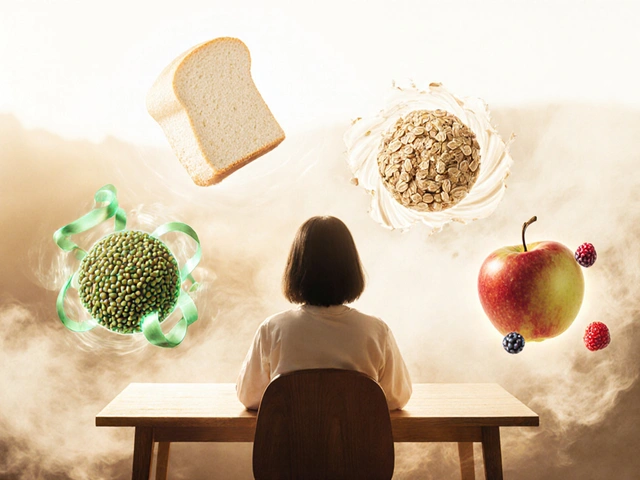


Shannon Amos
November 14, 2025 AT 17:21Wendy Edwards
November 16, 2025 AT 11:52Deirdre Wilson
November 17, 2025 AT 15:24Damon Stangherlin
November 18, 2025 AT 10:54Ryan C
November 20, 2025 AT 02:34Dan Rua
November 21, 2025 AT 12:55Mqondisi Gumede
November 22, 2025 AT 12:22Douglas Fisher
November 23, 2025 AT 19:11Albert Guasch
November 25, 2025 AT 05:55Ginger Henderson
November 26, 2025 AT 11:55Bethany Buckley
November 26, 2025 AT 21:50Stephanie Deschenes
November 27, 2025 AT 15:02Cynthia Boen
November 28, 2025 AT 02:12Amanda Meyer
November 29, 2025 AT 17:47